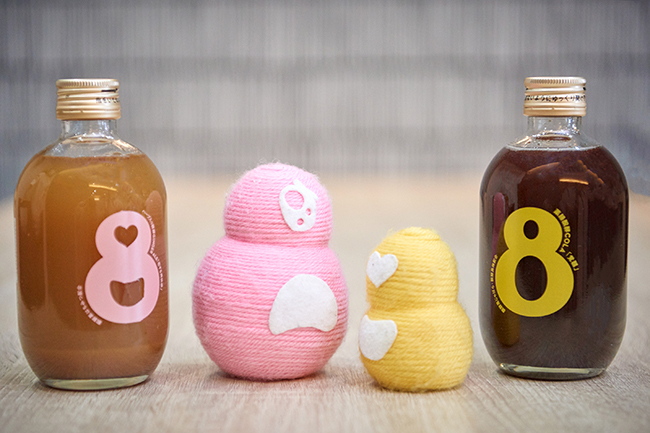8cco Fermented Beverages: A New Taste of Tradition
Nov 10,2022
8cco Fermented Beverages: A New Taste of Tradition
Nov 10,2022
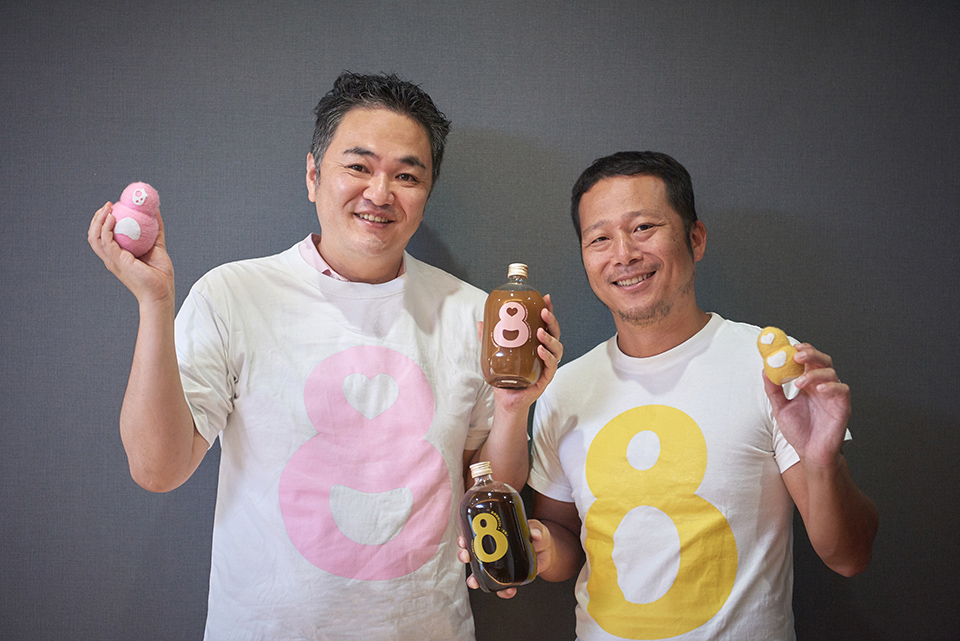

A figure-eight logo with a rounded shape. Colorful, pop-art wrapping paper. The taglines healing foods, fermentation, and love. 8cco (pronounced “hakko”) is a fermentation brand that uses bright colors and designs, as well as lots of text, for its products to exhilarate the person who picks them up. The adorable brand, and its instantly social-media-sharable image, is the brainchild of three self-proclaimed middle-aged guys.
Harnessing age-old fermentation and brewing techniques to create fermented food products that shine on center stage…
For this article, we had a conversation with Shibanuma Hideatsu, 8cco’s representative, about his thoughts on the entertainment fermentation brand, which he says they arrived at out of a singular desire to provide deliciousness and health, as well as their trendsetting fermented drink mixes.
Shibanuma Hideatsu, President and CEO of Kinokagura Inc., the parent company of the entertainment fermentation brand 8cco, is also the 18th-generation representative of Shibanuma Soy Sauce Co., Ltd. (located in Tsuchiura, Ibaraki), a soy sauce brewery with a history dating back over 300 years. He grew up surrounded by the aroma of soy sauce brewed by hand by artisans and matured in cedar barrels.
Shibanuma admits, however, that “when I was young, the last thing I wanted to be was a soy sauce maker”. For a period of time in his youth, he rebelled against the custom that the eldest son should take over the family business. Nevertheless, after graduating from the Tokyo University of Agriculture and working for over seven years at a major food manufacturer, his sentiments changed.
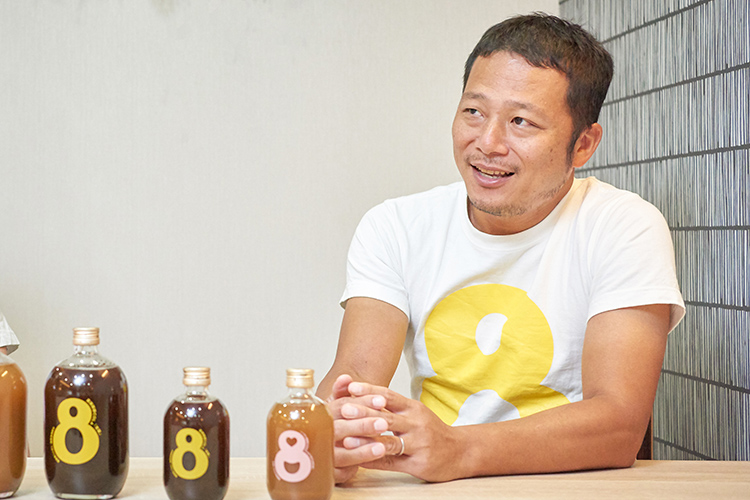
Shibanuma Hideatsu, President and CEO of Kinokagura Inc.
“When the family business, which had preserved its now rare wooden-barrel production method and long endeavored to sustain Japan’s food culture, plunged into a financial crisis, I realized I was the only person who could truly save it. That’s why I decided to take over the business.”
When Shibanuma returned to the family business, the company was being hit hard by the deteriorating market value of soy sauce, since the company competed on quality rather than quantity. He recognized how tenuous the business’s situation was, as large retailers were selling soy sauce at mineral-water prices and because the number of specialized soy sauce producers was falling every year. The dire circumstances pushed him to seek new approaches to market the company’s soy sauce and not simply rely on old methods. He managed to breathe new life into a long-established business by quantifying and optimizing the artisans’ skills to make better products and by exporting to countries experiencing an upsurge in the popularity of Japanese food.
“Japanese whiskies and wines are highly regarded overseas, and there is renewed interest in the skills and techniques used to craft them. Similarly, soy sauces brewed with traditional Japanese methods were greeted with an enormous reaction overseas because of their extremely high quality. Today, we sell Shibanuma Soy Sauce products to 62 countries around the world.”
But just as the business was finally back on a steady upward trajectory thanks to its successful overseas expansion, the COVID-19 pandemic hit. The unprecedented situation made overseas travel virtually impossible, and Shibanuma had to again rethink the company’s direction. Given that he had always sought out innovation while preserving traditions, it wasn’t surprising that he began exploring the possibility of developing non-soy sauce products and expanding into e-commerce.
Although he could tap into Shibanuma Soy Sauce’s technology and expertise, he decided that founding a new company would be the better option to create completely new products. With this in mind, he began looking for people with knowledge of online sales and quality control. Fortuitously, he met up with an old junior high school classmate, Komatsu Shin. Komatsu is now in charge of public relations at Kinokagura Inc.
“Komatsu came up to our booth at a food exhibition by chance, said he was an old friend of mine, and left his business card. I got in touch with him out of curiosity and found out he was working for an e-commerce company. I wanted to hear more, so I invited him out for a drink and got him to give me some advice. From there, we began talking about doing something business-wise together as old classmates.”
The pair got in touch with another classmate, Kobayashi Katsumi, who had taken over a honey producer in Gifu. He agreed to join the venture to oversee quality control. Three young guys, who had once been classmates in junior high school, had followed their own career paths, had gone through their own experiences, and matured into three middle-aged guys. Once they reconnected, Kinokagura Inc. got started in earnest.
“It would make a great story if we had developed our current product line right out of the blocks, but the truth is we crashed and burned badly two times. (laughs) We had picked a brand name, and each of us brought our own area of expertise. This made us super eager to get results right away, which led us to create products that we believed would sell and that we knew we could produce with the knowledge we had at the time. We tried things like dressings and seasonings like unprocessed moromi soy sauce. We personally thought we had developed some pretty fancy branding, but it was a complete disaster.”
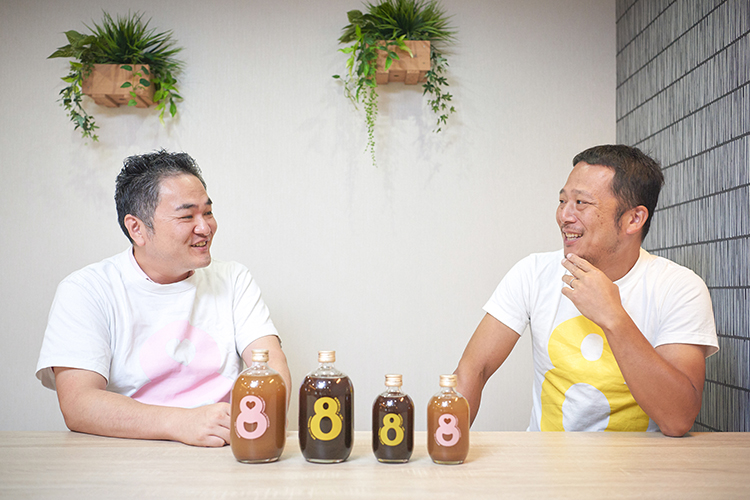
Their products failed to sell online, and day after day they lined their goods up at local product fairs, pitched them to prospective customers, and still came home with unsold product. The three discussed the lack of sales and arrived at the conclusion that their approach had been too simplistic. The trio had been so elated about getting into business together that they hadn’t taken their customers into account. Without a story or a narrative, even the very best products won’t sell.
They revamped their concept and managed to commercialize frozen vegetable soups made from discarded vegetables, but again sales struggled to grow.
“We reached a point where we either had to take the brand back to the drawing board or abandon the business entirely. With our backs against the wall, we finally truly hashed out our opinions for the first time. After a lot of discussion, we decided to take one last gamble on the business. We asked ourselves what we wanted to do, and what we could do that no one else could do. More importantly, we asked ourselves what would delight our customers. After an exhaustive consideration of many possibilities, we settled on a brand that delivers the benefits of fermentation, which is excellent for both health and beauty, in a new, more accessible form.”
The three men enlisted Nagoshi Ryo, an agricultural journalist and frequent TV commenter with a wealth of health knowledge, to help them produce the brand and create products better aligned with consumers. Not wanting to repeat their past missteps, the team explored all possibilities for fermentation without any preconceptions or limits on product categories. From this groundwork, they carefully put together products that maximized the potential of fermentation in combination with ingredients with perceived health and beauty benefits.

“We wanted health to be something that follows along with deliciousness, fun, and enjoyment, not something you have to endure. And we wanted to make this concept tangible through fermentation. After a lot of brainstorming, we hit on the idea of combining fermentation with carbonated drinks, which people often avoid because the drinks are unhealthy, despite their refreshing taste. From there, we developed our fermented cola mix and fermented ginger ale mix.”
The prime selling point of the products is, in addition to the fermented ingredients, the variety of medicinal herb spices used in the cola and the herbs used in the ginger ale. The drinks were finalized through a long process of trial and error intended to maximize the potential health and beauty benefits without compromising the taste. 8cco was also very particular about not using any sugar, and instead uses honey to sweeten the drinks.
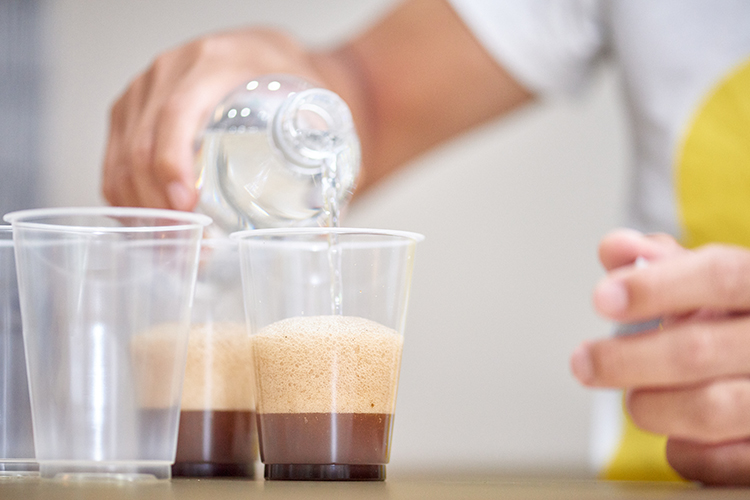
“Customers can enjoy our beverages in different situations throughout their day, by mixing them with soda water or milk or even with alcohol sometimes. You can have them in place of an energy drink before work or exercising; you can have them when relaxing or after a sauna. We hope each customer uses our products in their routines as their personal lifestyle partners.”
At the hands of 8cco, carbonated drinks, long synonymous with being detrimental to health, have been recast as healthy, guilt-free beverages. The brand is currently working on collaboration plans with the food & drink industry and other industries. Being both believers in the ideas of health + new + fun, 8cco co-sponsored the All-Japan Padel Championship in March 2021. Padel is a racquet sport that combines elements of tennis and squash.
“Our fermented drink mixes were, in a way, a last-ditch attempt. We hope the ideas and hopes of their creators will take off and communicate new fermentation possibilities to a wide range of generations.”
